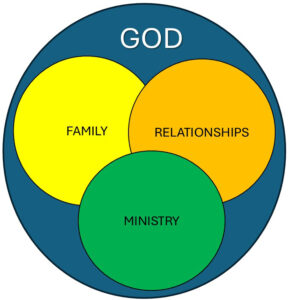 If I live to be 80, I have approximately 4,000 weeks to spend.[1] That’s it! It’s actually 4,160, but who wants to be so precise? Life is crazy short. I am 70, so I have spent about 3,500 weeks already and have only about 500 weeks left to spend until I’m 80. No wonder we say, “Time flies!” Life is a single breath on a cold morning, here for a moment and then gone (James 4:14). How we spend our weeks is how we spend that breath. William Penn once said, Time is what we want most, but what we use worst.[2] So … how do we spend our four thousand weeks?
If I live to be 80, I have approximately 4,000 weeks to spend.[1] That’s it! It’s actually 4,160, but who wants to be so precise? Life is crazy short. I am 70, so I have spent about 3,500 weeks already and have only about 500 weeks left to spend until I’m 80. No wonder we say, “Time flies!” Life is a single breath on a cold morning, here for a moment and then gone (James 4:14). How we spend our weeks is how we spend that breath. William Penn once said, Time is what we want most, but what we use worst.[2] So … how do we spend our four thousand weeks?LIFETIME HOURS
According to a 2023 study, in a lifetime, Americans will spend, on average:
- 28 years, 2 months, and 5 days sleeping
- 15 years, 3 months, and 7 days working and doing work-related activities
- 13 years, 11 months, and 9 days relaxing and doing leisure activities
- 7 years, 7 months, and 6 days doing household activities
- 6 years, 3 months, and 15 days caring for children
- 5 years, 7 months, and 13 days socializing and communicating
- 4 years eating and drinking
- 1 year, 5 months, and 16 days traveling to work[3]
We work more than we relax. According to the same study, people in Washington, D.C., work the most, while people in West Virginia and Alaska work the least.
WEEKLY HOURS
Breaking it down to weekly averages, we spend our time on average doing the following activities.
- 56 hours sleeping (assuming 8 hrs. of sleep per night)
- 7.8 hours eating
- 11.7 hours driving
- 40 hours working
- 8 hours online (internet and social media)
- 19.6 hours watching television
- 24.9 hours for miscellaneous activities (cleaning, home projects, leisure, church)[4]
We can’t do everything, so how do we manage our hours? If time is our most precious resource, how do we invest it wisely? Time management guru Nir Eyal, in his book Indistractable, argues that we must make time for traction and prevent distraction. Traction, he writes, is whatever activities draw us toward our priorities in life. Distraction is anything that pulls us away from those priorities.[5] We don’t want to be ‘squirrely’ chasing after every nut that falls to the ground. On the other hand, we don’t want to be so driven by our goals that any interruption becomes a distraction to be avoided. God-given interruptions can be traction actions!
TRACTION OR DISTRACTION?
Our values guide our choices. As a Christian, eternity matters. Eternal priorities determine our values (Mt. 6:19-21). How we spend our weeks defines who we are in life. Actions that matter eternally are traction actions. All other actions are distractions. The fundamental question I ask myself at every fork in the road is: Does this matter eternally or not? Does this activity have eternal value? Asked that way, a career can have eternal value because it is through the job that God is shaping me to be more like Christ, to provide for my family, and to share the gospel, all of which have eternal value. But arguing about politics, for example, has zero eternal value.
My relationship with God/Christ is all about eternity. He is remaking me now to live forever with Him (2 Cor. 3:18). Within my relationship with God, three overlapping spheres of life have eternal value.

TIMEBOXING
Nir Eyal used this term to describe his method for managing time. He recommends that we plan our days by putting the activities that lead to our priorities in color-coded boxes on our calendars so we can quickly see how we are using our time. The objective is to avoid distractions by focusing on actions that give us traction toward our priorities. As we all know, in ministry and life, others will quickly take control of our lives if we let them. Having no plan is a recipe for distracted living, driven by the agendas of others who are only too happy to tell us what we should be doing. There will always be more to do than we can do.
MY THREE BLOCKS
Times change. Seasons of life adjust our schedules. Now, I am semi-retired, but my life verse remains the same (Phil. 3:10), and my life goals still revolve around serving Christ until my last breath (Mt. 6:33). The older I get, the more the three spheres of life guide my activities. I constantly ask myself: Does this matter eternally? A healthy ‘retirement’ means I have someone (some people) to love, something to do, and friends with whom to share life. I firmly believe that we should not merely retire from something. We should retire to something. God calls us to be productive for eternity throughout our temporal lives.
However, in this season of life, my three blocks look a little different. Mornings are devoted to God and ministry. Afternoons are devoted to home projects and relationships. Evenings are devoted to family and personal life. Several years ago, I was taking an online course in photography (in my evenings!) taught by Andy Mumford. He said something that I keep on my desk as a reminder.
About the Author:
David Christensen served in dual ministry for thirty years as a Bible college professor and local church pastor. He is the founder of The Rephidim Project, a ministry devoted to encouraging and equipping pastors for expository preaching. David is the author of seven books including “A Philosophy of Pastoral Preaching: Shepherding God’s People with God’s Word in One Place.” He retired as Preaching Pastor of Galilee Baptist Church in 2018 to devote himself to encouraging pastors, missionaries, and church leaders through Bible exposition and teaching the methods of expository preaching to the next generation of preachers.
[1] Oliver Burkeman, Four Thousand Weeks: Time Management for Mortals.
[2] https://www.tempo.io/blog/how-do-people-spend-their-time
[3] https://www.deputy.com/blog/how-americans-spend-their-time
[4] https://www.tempo.io/blog/how-do-people-spend-their-time
[5] https://www.sparkingdrive.com/post/who-we-are-is-how-we-spend-our-time


